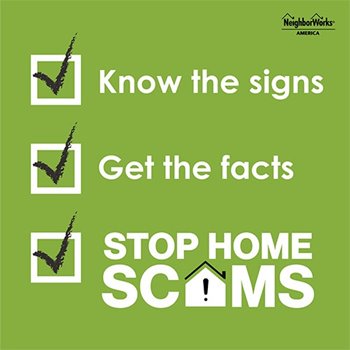In January 2021, NeighborWorks America started its Stop Home Scams initiative to raise awareness about housing scams, which often become more prevalent during times of economic hardship. Focusing on regions with high foreclosure rates, NeighborWorks America engaged network organizations to help spread the word. With the ending of pandemic evictions and foreclosure moratoria, network leaders continue to be concerned about a rise in scams.
"Millions of families are facing housing insecurity now," shares Lee Anne Adams, NeighborWorks' senior vice president for National Initiatives. "We know from experience that when someone is struggling economically and vulnerable, they are more likely to be preyed on by scammers. We must continue to educate and arm consumers with the tools to protect themselves."
The Federal Trade Commission reported 33,134 fraud attempts related to mortgage lending in the first three quarters of 2021. Numbers for the fourth quarter have not yet been compiled. Fraud reports in this category for the first three quarters of 2019 resulted in 27,248 reports – 17 % lower than 2021. This month, a few NeighborWorks network leaders shared their experiences.
Housing Partnership of Morris County
The client called Housing Partnership of Morris County in a panic. She'd been paying $800 monthly to an organization to help with her loan modification. Then she received a letter from the sheriff's office with a foreclosure auction date. She called her modification company. Their phone was disconnected.
an organization to help with her loan modification. Then she received a letter from the sheriff's office with a foreclosure auction date. She called her modification company. Their phone was disconnected.
"She thought she'd taken care of it," says Jessica Padilla Gonzalez, CEO of Housing Partnership. "But they were just taking her money." The NeighborWorks nonprofit advised her to file an extension, giving her more time to resolve the situation. Housing Partnership of Morris County is helping her through and providing instructions on how to report the company that scammed her.
The nonprofit is helping another individual in a similar situation. Meanwhile, they've posted billboards in English and Spanish alerting individuals to beware of scams. "The number of calls we're getting in Spanish is increasing, so I think it's working," says Padilla Gonzalez, whose organization received a grant from NeighborWorks last year to help raise scam awareness. Along with the billboards, leaders from her nonprofit have jumped on community calls with the mayor to alert the community and local government about scams and about the ways HUD-approved housing counselors can help residents remain stably housed.
"Some banks have told clients they have to work with us before they'll be considered for a loan modification, so that's been helpful," Padilla Gonzalez says. "We usually get more calls about prepurchase. Since October, we've been getting calls about foreclosure."
Community Development Corporation of Long Island
 "Since the pandemic, the foreclosure market has been quieter overall," shares Tricia Gleaton, vice president of the Homeownership Center for Community Development Corporation of Long Island (CDCLI). While her organization hasn't seen a lot of scams so far, the end of federal eviction and foreclosure moratoria means they may see more this year. "If things go in the direction that we think they'll move in, we'll see an uptick in everything."
"Since the pandemic, the foreclosure market has been quieter overall," shares Tricia Gleaton, vice president of the Homeownership Center for Community Development Corporation of Long Island (CDCLI). While her organization hasn't seen a lot of scams so far, the end of federal eviction and foreclosure moratoria means they may see more this year. "If things go in the direction that we think they'll move in, we'll see an uptick in everything."
That means an uptick in evictions and foreclosures and an uptick in people taking advantage of those already in economic distress. Counselors are particularly worried about older homeowners, who lost $1 billion in online scams in 2020, according to the FBI's Internet Crime Complaint Center. To combat scams, CDCLI continues to spread the word on social media and to plans to increase scam-prevention education, already a regular part of their homeowner education.
Habitat for Humanity of Michigan
Like CDCLI, Habitat for Humanity of Michigan, teaches scam awareness in courses on housing education and consumer protections. They talk about scam calls and emails, which have increased nationally, says Housing and Family Services Manager Anitra Austin. Staff have sent fliers to affiliates, providing information on consumer protection and how to recognize scams.
"We want people to be cautious, to make sure they can identify whether something is a legitimate notification or a scam," she says. Each time Habitat offers a consumer protection class, students report having been approached with a scam. "It's a constant issue. Scams can be difficult to track. But we hope that with the information we provide and the resources we share, the number will decrease."
01/24/2022

